Khmer Organic
News and Updates
Monthly Bullettin
![]() What are sweet fruits are waiting for use this August? Let’s find out
What are sweet fruits are waiting for use this August? Let’s find out
![]()
![]()
![]()
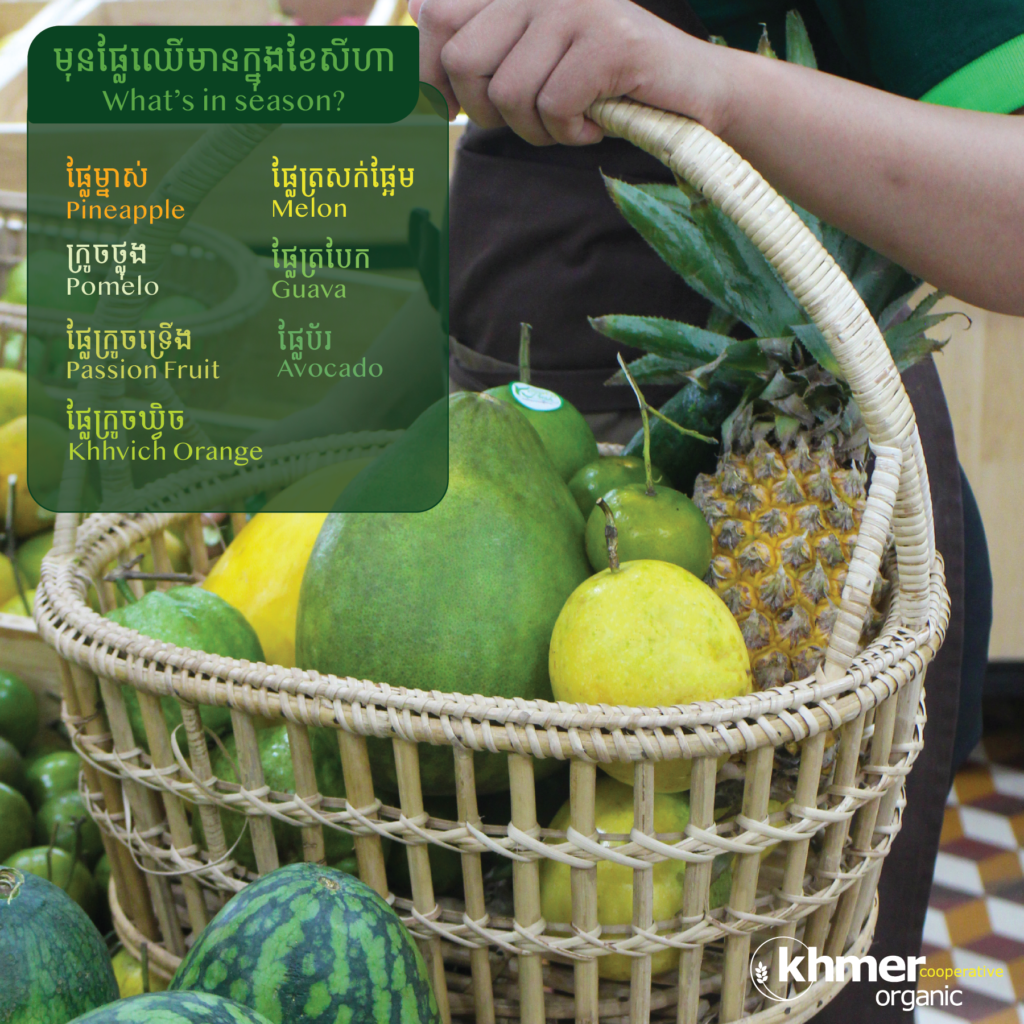
Free Range Eggs
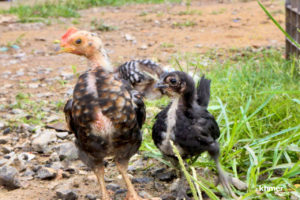 Did you know?
Did you know?
Free range eggs, which come from chickens that have space to roam, have been shown to have higher levels of magnesium, as well as beta carotene, than caged eggs.
Research also shows that these eggs contain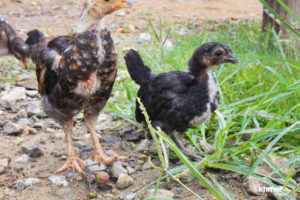 higher levels of antioxidants and anti-inflammatory omega-3 acids.
higher levels of antioxidants and anti-inflammatory omega-3 acids.
On our farms, the chickens are raised on a natural diet free from pesticides and antibiotics. This makes Khmer Organic eggs an excellent and safe choice for a healthy diet.
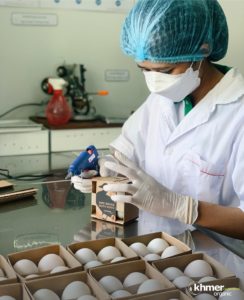 Each egg is transported straight from the farm to our processing facilities, where our quality control team inspect each and every egg by hand. While it is hard work, we do this to ensure that every egg is of the highest quality – that’s why you won’t find any rotten eggs from us!
Each egg is transported straight from the farm to our processing facilities, where our quality control team inspect each and every egg by hand. While it is hard work, we do this to ensure that every egg is of the highest quality – that’s why you won’t find any rotten eggs from us!
After being carefully washed and packaged in their eco-friendly packaging, they make their way to our shelves, and then your plates, for you to enjoy.
Bring your own reusable shopping bags and help reduce plastic waste
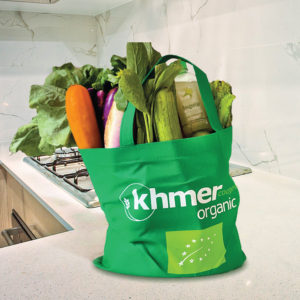 Reusable shopping bags are a fantastic alternative to single-use plastic bags. It goes beyond just grocery shopping – bring them along for all shopping trips!
Reusable shopping bags are a fantastic alternative to single-use plastic bags. It goes beyond just grocery shopping – bring them along for all shopping trips!
Did you know?
By choosing to refuse plastic shopping bags, you can save around 500 plastic bags per year from entering our oceans and landfill.
*TIP: Keep a stash of your reusable shopping bags where you can remember like in the car or by your front door to avoid forgetting.
Click here for more info: https://www.plasticfreejuly.org/
The Difference: Milky Mushroom VS Oyster Mushroom
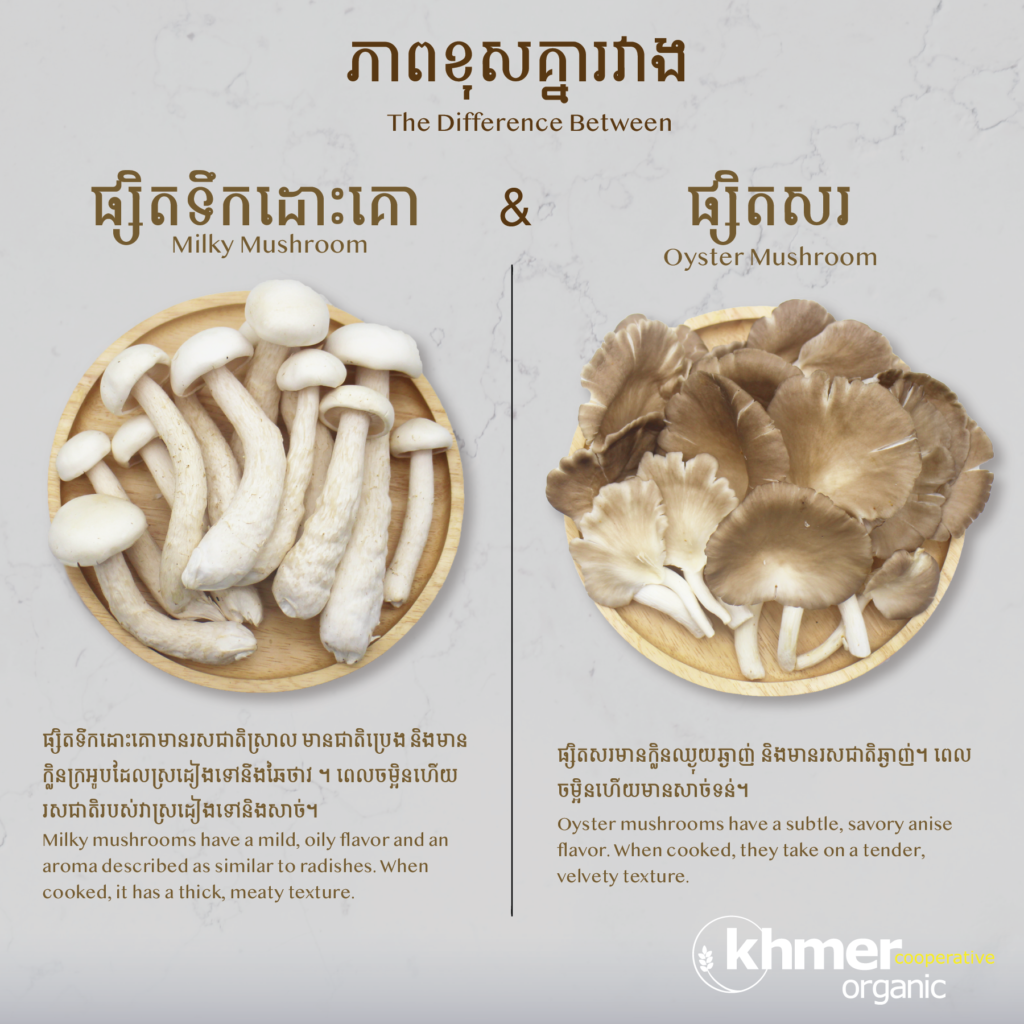
Mushrooms are a versatile favorite in Cambodian kitchens. Which one is your favorite?
Both the oyster and milky mushroom are a rich source of protein and Vitamin B2, Vitamin E and Vitamin A, as well as phosphorus, potassium and selenium. Studies also found that components in mushrooms prevent dementia and act as antioxidants.
Between the two mushrooms, milky mushrooms contain more Vitamin C than oyster mushrooms. Studies have shown that it also contains anti-hyperglycemic benefits, which is beneficial for people with diabetes.
Differences in taste:
Oyster mushrooms have a subtle, savory anise flavor. When cooked, they take on a tender, velvety texture.
Milky mushrooms have a mild, oily flavor and an aroma described as similar to radishes. When cooked, it has a thick, meaty texture.
Both mushrooms can be used in a wide variety of ways, from stir-frying, steaming, grilling, deep-frying, to being used in soups and stews.
How do you store mushrooms?
Plastic wrap traps moisture and causes spoilage to happen faster. For this reason, store mushrooms, unwashed, in a porous paper bag, or wrap them in paper towels, for up to one week in the refrigerator.
How do you pick good mushrooms?
The mushrooms should have a firm, smooth appearance. The surface should be dry, but not dried out, and should appear plump.
About Khmer Organic mushrooms:
Our mushrooms are sourced locally from farmers who grow them according to EU and USDA organic standards. Through our work, we support their livelihoods by improving their income. We work with these farmers to carefully pick the best mushrooms for our consumers to enjoy.
The Difference : White Corn VS Yellow Corn
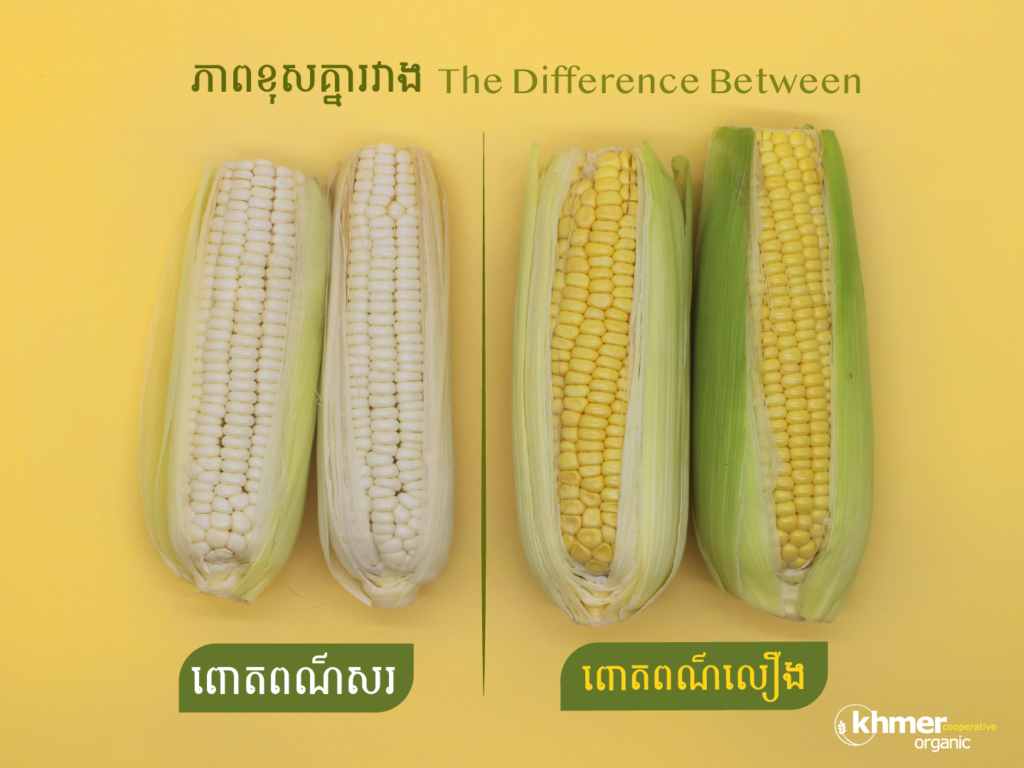
What’s your favorite color to eat?
Corn comes in a variety of different colors, although the most common are white and yellow.
Nutritional benefits of corn:
Corn is rich in Vitamin C, which protects your cells from damage and reduces the risk of cancer and heart disease. Corn is also a good source of lutein, which is good for your eyes and helps prevent cataracts.
Between the two colors of corn, yellow corn is slightly more nutritious, because beta carotene, which makes corn yellow, turns into Vitamin A when digested.
Differences in taste:
For Khmer Organic corn, grown locally in Cambodia, yellow corn has a sweeter taste than white corn. Our white corn also has a more starchy texture.
How do you pick the best corn?
According to experts, to pick the best corn, look for the one with the deepest yellow kernels. The husks should be green, tight, and not dried out. The brown ends of the silk poking out at the top should still feel moist, and the corn should be solid when you squeeze it.
How do you store corn?
It’s important to keep the corn from drying out. You can do this by wrapping the corn tightly in a plastic bag and keeping it in the refrigerator.
If you don’t plan on eating the corn within three days, you can also freeze it.
About Khmer Organic corn:
Our corn is grown locally by farmers in Cambodia, according to EU and USDA organic standards. Through our work with local farmers, we are able to not only improve their livelihoods, but also promote a more sustainable way of farming healthy produce.
Creating Rural Wealth Through Organic Farming

What do you do when you’re a 68-year-old farmer who has to support a wife and three grandchildren, but all you have is a small patch of land?
Mr Choub Phan from Prey Veng earned a measly yearly income of $1000 a year growing sweet corn, eggplants, pepper and rice. Tired of struggling to support his family in his old age, he and his wife borrowed money from local microfinance institutions to boost their farming activities.
However, the elderly couple’s reliance on traditional agriculture and lack of proper equipment and technical knowledge meant that their efforts were never quite fruitful.
Determined to fix this, Mr Phan joined Khmer Organic Cooperative’s Market and Capacity Development Project and became one of Khmer Organic Cooperative’s producers in 2018. Through his involvement with this program, he was able to attend training sessions on organic requirements and standards, farm management, pre- and post-harvest management, and environmental sustainability. These training sessions were organized by KOC and Kunthamlay and funded by Heifer International Cambodia.
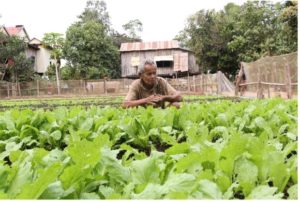 Under the careful guidance of Khmer Organic Cooperative’s field technicians, Mr Phan was able to greatly improve his farming techniques and became one of the 17 farmers who received certifications by the Control Union.
Under the careful guidance of Khmer Organic Cooperative’s field technicians, Mr Phan was able to greatly improve his farming techniques and became one of the 17 farmers who received certifications by the Control Union.
After his training, he successfully established a small commercial farm. Nowadays, he and his wife mainly grow leafy vegetables for Khmer Organic Cooperative’s shops, producing up to 120 kg of organic produce a week.
His livelihood also improved by growing organic vegetables, he was able to bring in $120 a month – more than he was earning growing vegetables with chemical fertilizers.
This seemingly small increase has made a world of difference to Mr Phan and his family, as he and his wife were subsequently able to support their grandchildren’s education up until their graduation. This meant a lot to the elderly couple, who want their grandchildren to have a good education and well-paying jobs so that they can have better futures. This dream drives Mr Phan’s efforts to improve his family’s quality of life.

By supporting local farmers such as Mr Choub Phan, we are not only able to support their livelihoods, but also ensure a better future for them and their families.
World Food Safety Day 2021
Khmer Organic Cashew
The best cashews come from Kampong Thom. And so naturally, we source ours from there.
The safest cashews are grown using organic methods. And so of course, we work with local farming communities to uphold organic standards.
Once it arrives from the farm, our team inspects each cashew by hand. This means that we select only the best to process and package.
Our team looks for three things:
- Color
Only the fairest of them all makes it through. Khmer Organic Cashews strictly range from white to ivory. The light color means that they were minimally roasted. This in turn ensures a higher nutritional content than their darker, scorched counterparts.
- Size
Only the largest cashews (commonly referred to as W180) pass inspections. Dubbed the King of Cashews, this is the highest possible grade.
- Aesthetics
Only the ones that meet the visual specifications pass. This includes only nuts that are
- Fully intact
- Has no pieces of shell attached
- Are white
- Have no blemishes
- Are correctly shaped
- Are not mouldy
- Are not damaged by pests
- Are not ruined by plant diseases
- Do not have water stains
- Have not begun to go rancid
Only the small batch of nuts that pass this rigorous inspection are allowed to move to the next stage.
Sources:
https://www.phnompenhpost.com/business/cambodian-farmers-cash-high-cashew-prices
https://www.khmertimeskh.com/301893/demand-for-cambodian-cashews-on-the-rise/
https://kimmyfarm.com/en/what-difference-between-white-cashew-vs-scorched-cashew
Gently Roasted and Lightly Seasoned
Most cashew companies deep fry or bake their cashews. At Khmer Organic, however, we value the importance of healthy preparation methods for the most wholesome foods.
Thus, we use the best processing methods for our top-tier cashews. Roasting them briefly gives them a delightful texture, nutty smell, and excellent taste.
Most significantly, though, this gentle cooking process allows the nuts to hold onto their good fats.
Furthermore, we source the best local ingredients for our flavors. They include
- Superfoods such as Turmeric and Moringa
- Artisanal seasonings such as Kampot salt, Khmer Organic Red Pepper, and Long Pepper
- Organic ingredients traditionally used in Tom Yum
Of course, we also have a non-seasoned flavor, which allows the creamy nuttiness of cashews to truly shine. Yum!
Organic Production Contract signing between Khmer Organic and Agricultural community
On Friday, September 10, 2021, Khmer Organic Cooperative signed a contract on organic vegetable production with the agricultural community of Kraing Lvea commune and the agricultural community of Thlok Vieng Meanchey, Kampong Chhnang province, with the participation of Mr. Ngin Hun, Director of Kampong Chhnang Provincial Department of Agriculture, Forestry and Fisheries. And Mr. Kong Pheach, Director of the Department of Agro-Industry via online (Video Zoom), with the participation of officials from Kampong Chhnang Fisheries Administration District, specialized offices under the Department, Development Partners (DCA, EU and FNN) and a total of 29 agricultural communities. With this contract, the Khmer Organic Cooperative aims to enable the farming community to have a specific contract that guarantees a fixed price from cultivation to harvest and maintains organic quality standards so that consumers can enjoy local organic vegetable. To ensure the quality of organic vegetables, Khmer Organic Cooperative also prepare a truck that has a vegetable transport system equipped with a cooling system for the products of the farming community.
Accordion Title
Launching event “Export Development Program-EDP 2023 & Organic certification celebration"
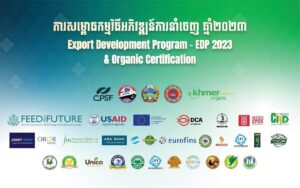

















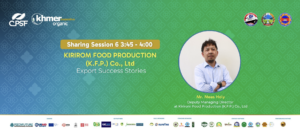


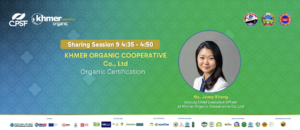 Press release-Launching event “Export Development Program-EDP 2023”
Press release-Launching event “Export Development Program-EDP 2023”
December 18, 2023
Cambodia Pepper and Spices Federation (CPSF) and Khmer Organic Cooperative Co., Ltd. (KOC) will co-organize an “Export Development Program-EDP 2023” at the Independence Hotel by Dara, Sihanoukville (city), Preah Sihanouk Province, on December 18, 2023 from 8:00am-5:00pm. The event is presided over by H.E Kim Meassokseiha, under-secretary of state, Ministry of Commerce, accompanied by government representatives, donor organizations, and other development partners.
Over 250 companies and organizations are expected to participate in the event including modern trade and supermarkets, distribution companies, trading companies, agricultural cooperatives and associations, federations, input suppliers, government, development partners, embassy representatives, processors and Cambodian successful exporters who will engage, connect and network.
The Export Development Program – EDP 2023 is a comprehensive program that aims to support CPSF members and their partners with knowledge and skills through a variety of selected activities including export launching program, export financing program. Organic certification celebration under the standard of EU, USDA and Canada of Khmer Organic Cooperative. “Our common goal is to increase competitiveness of Cambodian agricultural products, specifically organic products in Export Markets.”
In addition, the EDP program will offer a variety of other activities including key stakeholder engagement, presentations, panel discussions, lessons-learned and success stories from Cambodian exporters.
The EDP 2023 and Organic Certification celebration are implemented by CPSF and KOC, through funding support from USAID-Feed the Future Cambodia Harvest III, EU, RECOVER, DCA, and HEKS EPER.
Our Video Gallery
Videos that we have produced throughout the years to provide a glimpse into what we are doing at Khmer Organic as well as to keep everyone updated with recent activities in our company.
We Are Khmer Organic
We are Khmer Organic. Our vision is to help improve local farmers’ livelihood and ensure the safety of our customers.
Building Resilience Post Pandemic COVID19
Store Safety at KOC
Steps our staff takes in the shop in order to prevent the spread of COVID-19!
Customer Delivery
Online delivery process at our KOC Shop for our customers that are too busy or wants to decrease the chance of coming into contact to prevent COVID-19!
Our Presentation at Cambodian Pepper and Spice Federation (CPSF)
Khmer Organic proudly presents at Organic and Natural Digital Expo, jointly with other Cambodian exporters with the support of the Cambodian Pepper and Spice Federation (CPSF).
The process of Organic Certification
Khmer Organic farm certification process documentary. In this video, you will understand the organic certification from EU organic standard.
Ginger Mint Limonade
Ginger Mint Limenade made with Wild Forest Honey from Mondulkiri is a delicious, refreshing way to stay cool in the heat!
How to peel durian
Let’s peel durian together!
Send this video to someone who needs it!
